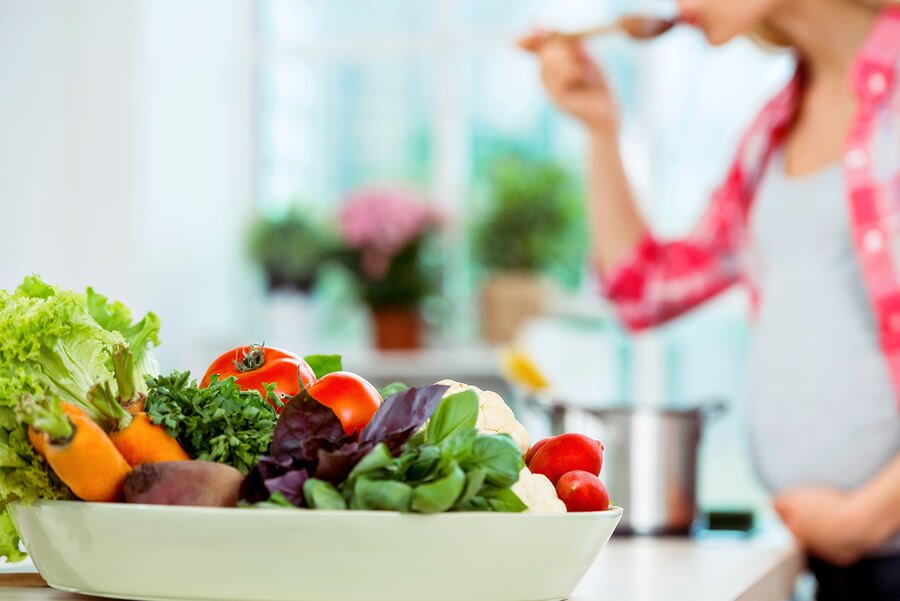Soft Food Diet for Pregnant Women

Many women suffer from diarrhea during pregnancy, usually due to hormonal changes and sensitivity to certain foods. Although the episodes are typically short-lived and almost never end in a more severe problem, it’s recommended to take precautionary measures, such as following a soft food diet.
Some home care is usually enough. However, if there is any cause for alarm or doubt, immediately go to the doctor. Food also plays a significant role in recovery.
Below we’ll describe some of the recommendations and ideas for a soft food diet for pregnant women.
What should a pregnant woman do if she has diarrhea?
Pregnant women usually have short-lasting diarrheic episodes that disappear spontaneously. They typically don’t pose any risk to the baby’s health.
However, if diarrhea lasts for more than three days, it’s necessary to consult a physician. Similarly, it’s required to visit a medical professional immediately if there is blood in the stool or if the mother has vomiting or fever.
While this problem exists, the mother should rest and avoid exerting herself. She should also drink plenty of fluids such as water or juices to avoid dehydration.
In this situation, food is a fundamental part of the recovery. It can be the primary treatment for diarrhea.
A soft food diet ensures that the future mother will recover and the baby will be adequately nourished.

How to avoid diarrheic episodes?
You can prevent some diarrheic episodes by taking precautionary measures. Pregnant women must take this into account to avoid worrying and unnecessary problems.
The most important thing is to maintain a balanced diet at all times. During pregnancy, the mother’s diet must meet the nutritional requirements of the gestation period.
However, many women use pregnancy as an excuse to consume excessive sweets or very excessive amounts of food.
The overconsumption of greasy food or excessive portions can affect pregnant women’s digestive health. It’s essential to try to always eat fresh food that is in excellent condition and that complies with all sanitary standards.
What is the soft food diet for pregnant women?
The soft food diet aims to ingest only foods that aren’t heavy for the body and are easy to digest.
If a pregnant woman has digestive problems such as diarrhea, she should take care of herself. It’s critical for her to follow the diet strictly for a few days until she fully recovers.
So, what does a soft food diet for pregnant women include? One of the most critical aspects of this diet is drinking plenty of fluids, including non-citrus fruit juices, infusions, or water.
According to this diet, pregnant women should avoid consuming carbonated drinks, milk or coffee.
“It’s essential to try to always eat fresh food that is in good condition and that complies with all sanitary standards.”
In general, the food that makes up a soft food diet is cooked, lightly seasoned, smooth in texture and free of fat. Some of the most highly recommended food products are yogurt with probiotics, apples, or peeled and cooked pears, potatoes, and rice.
You can also eat cooked oats and soft meats such as chicken and turkey. Fish is also allowed. Boiled or mashed vegetables, like vegetable purees – without dairy – are ideal.
Nuts, milk, and chocolate are among the foods to avoid at all costs. Also avoid red meat, fatty food, spicy food and food rich in fiber.

Soft food diet menu for pregnant women
When a pregnant woman needs a soft food diet, she can eat yogurt with probiotics and toast with turkey at breakfast. She can also add an infusion.
By midmorning, she can eat a piece of fruit, cereals or some whole wheat bread with turkey.
For lunch, an ideal menu consists of chicken or grilled fish accompanied by boiled potatoes and carrots. It can end with a mint infusion.
Later in the late afternoon, she can eat another piece of fruit, have some juice or a fruit and vegetable smoothie.
Finally, for dinner, she can have soup or a vegetable puree – cooked and passed through the blender – along with grilled chicken or veal. As with lunch, it’s very good to end with a mint infusion.
All cited sources were thoroughly reviewed by our team to ensure their quality, reliability, currency, and validity. The bibliography of this article was considered reliable and of academic or scientific accuracy.
- Guarino A., Guandalini S., Lo Vecchio A., Probiotics for prevention and treatment of diarrhea. J Clin Gastroenterol, 2015. 49: 37-45.
- Li J., Zhao H., Song JM., Zhang J., et al., A meta analysis of risk of pregnancy los and caffeine and coffee consumption during pregnancy. Int J Gynaecol Obstet, 2015. 130 (2): 116-22.